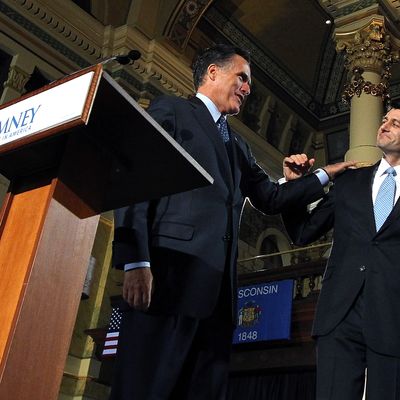
The Republican campaign has been relentlessly focused on the goal of making voters hold President Obama responsible for the aftereffects of the 2008 global economic crisis. (See, for instance, these ads on “the Obama economy.”) But the party intends to use its power, should it win election, not to focus on decreasing short-term unemployment but on implementing a dramatic long-term restructuring of the scope of government. Mike Allen reports that Mitt Romney, in meetings with campaign donors, is tying himself more tightly to the Paul Ryan plan.
Pull back for a moment and consider Ryan’s role within the party, which is really pivotal. For several months, Ryan has been imploring Republicans not only to support his plan but to embrace it. Why should they do so? Because, when they win, then they will be able to implement the full thing. At a high-profile speech at the sacred locale of the Reagan library yesterday, Ryan hammered home the theme again:
I believe boldness and clarity of the kind that Ronald Reagan displayed in 1980 offer us the greatest opportunity to create a winning coalition in 2012. We will not only win the next election, we have a unique opportunity to sweep and remake the political landscape. …
If we make the case effectively and win this November, then we will have the moral authority to enact the kind of fundamental reforms America has not seen since Ronald Reagan’s first year.
What Ryan is up to here, and what he’s been up to for more than two years, is this: He is trying to win an argument within the party that will occur after the 2012 election.
Should that happen, at least some of the more vulnerable Republicans will propose some measure of caution. They will believe the party won due to the poor state of the economy, not because of the Ryan plan (more accurately, even despite its embrace of the Ryan plan). Ryan wants to discredit that objection in advance.
The connecting thread of my last two print stories for the magazine — the first on the GOP’s almost panicked now-or-never focus on 2012, and the second on the rise of Paul Ryan — is that the Republicans, led by Ryan, have made a strategic decision that the economic crisis offers them an expiring window of opportunity to pass the agenda of their dreams. Should they win the election, it is vital that they use their majority immediately and to maximal effect. That’s why Ryan insisted on boxing the party in by getting his fellow Republicans to take dangerous votes on his budget in 2011 and again this year despite having no chance of signing into law under Obama. By making virtually all Republicans in Congress take the vote now, they will have a hard time claiming next year that voters don’t want such radical change.
I don’t think Ryan particularly cares whether Republicans actually win by running on his plan or merely can be persuaded that they have done so. He would probably be perfectly happy for Romney to win solely by focusing on the lingering effects of the economic crisis, as long as the party turns around and uses the win to pass his plan. The point is, Ryan has been setting up the big gamble for a long time — win the presidency, House, Senate trifecta in 2012 and pass his plan — and everything he’s doing is geared toward locking the rest of his party into it.






























